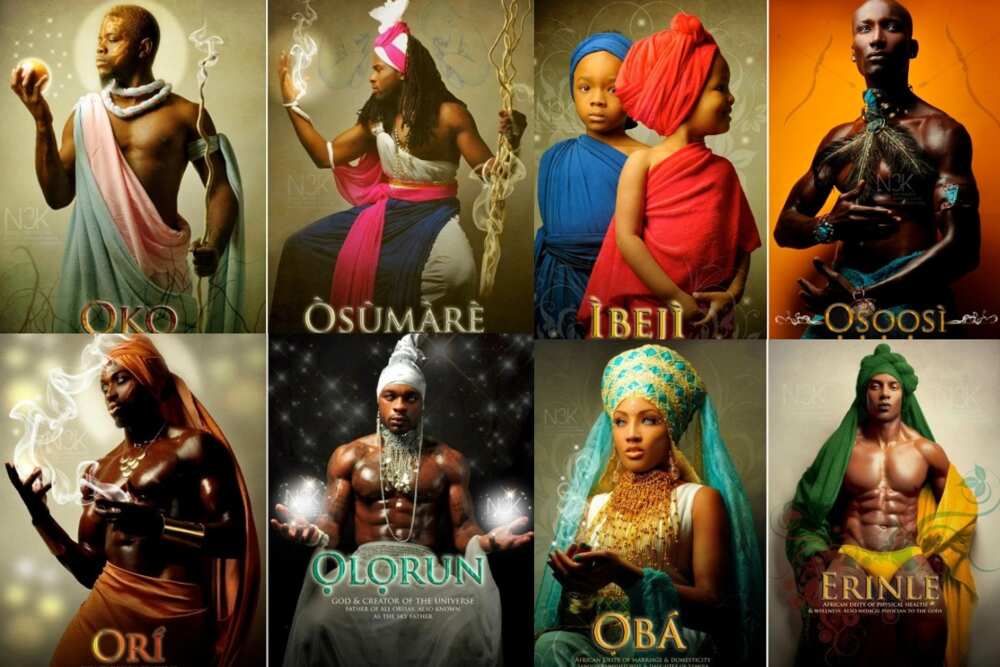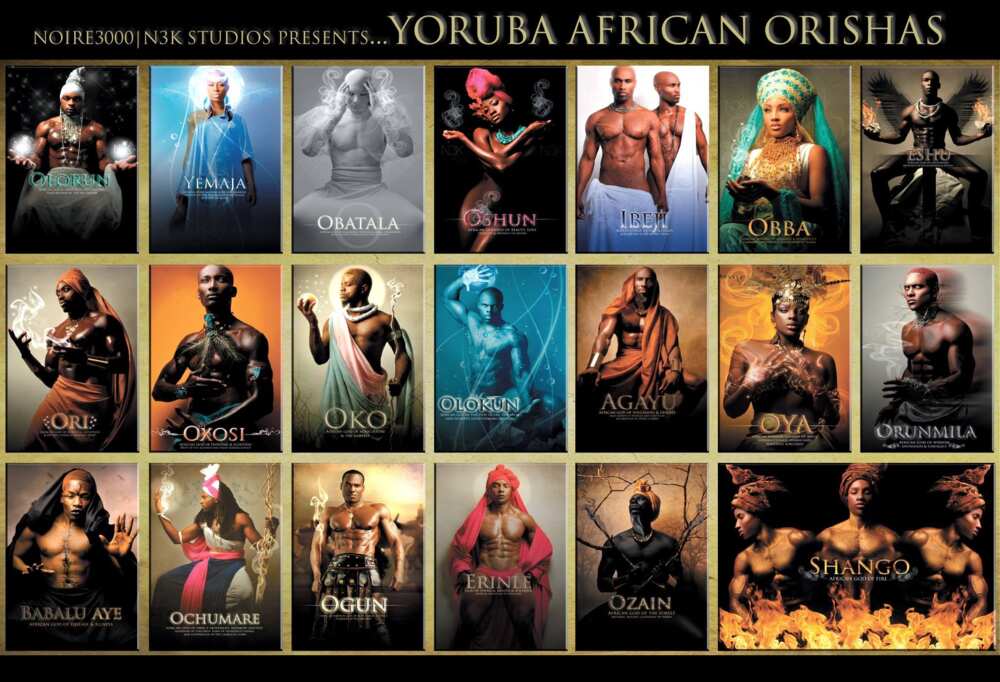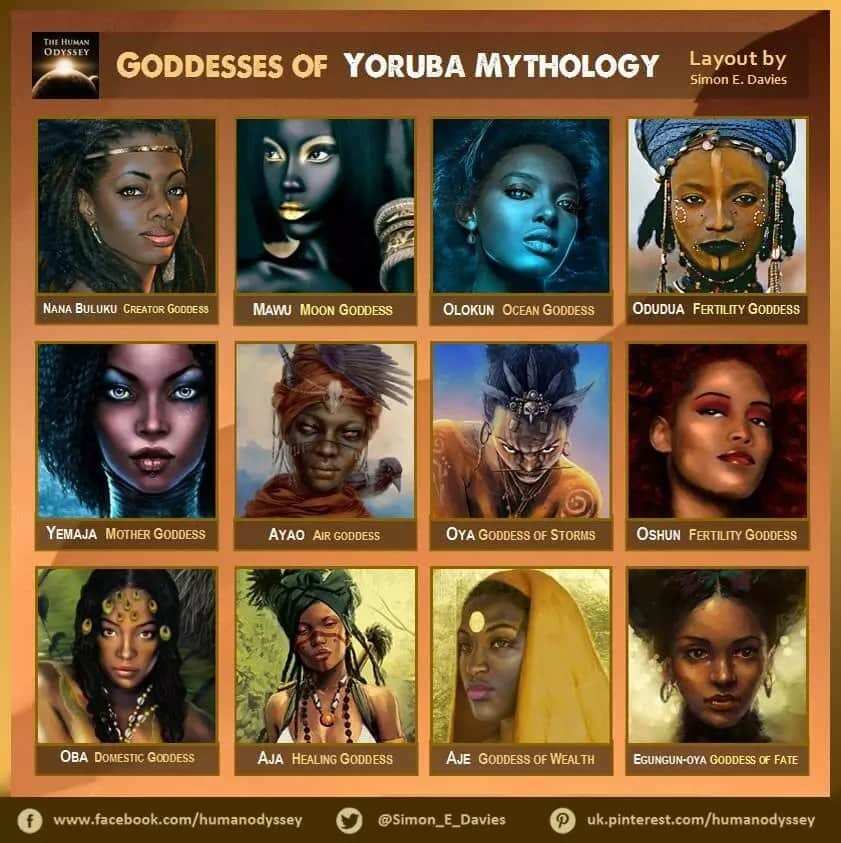Discover The Yoruba Gods: Orishas, Mythology, And Culture
Ever wondered about the sheer scale of belief systems? The Yoruba pantheon is a testament to the human capacity for faith, boasting a staggering assembly of up to 6,000 deities.
This complex spiritual tapestry, woven from the rich cultural heritage of the Yoruba people of Nigeria, features a diverse array of gods and goddesses, each with unique attributes, responsibilities, and stories. These figures, known as Orishas, are not merely abstract concepts; they are active participants in the lives of the Yoruba, serving as intermediaries between humanity and the supreme being, Olodumare.
| Attribute | Description |
|---|---|
| Origin | Yorubaland, primarily in Nigeria, Benin, and Togo; with significant diaspora influence in the Americas. |
| Supreme Being | Olodumare (also referred to as Olorun), the creator and source of all existence. |
| Key Figures | Olorun/Olodumare (Supreme Creator) Obatala (God of Purity and Creation) Ogun (God of Iron, War, and Technology) Oshun (Goddess of Love, Beauty, and Fertility) Shango (God of Thunder and Justice) Yemoja (Goddess of the Ocean and Motherhood) Ifa/Orunmila (God of Wisdom and Divination) Eshu/Elegba (Trickster God, Messenger) |
| Pantheon Size | Estimated up to 6,000 Orishas, each representing different aspects of nature, human traits, and ancestral spirits. |
| Categories of Deities | Primordial Deities: The oldest gods, predating the creation of the world. Natural Deities: Gods of natural forces, such as the weather and plantlife. Deified Ancestors: Honored ancestors who have ascended to divine status. |
| Core Beliefs | A belief in a single supreme creator (Olodumare) and a pantheon of deities (Orishas) who act as intermediaries. The concept of Ashe (Ase), the divine life force that permeates all things. Reverence for ancestors and their continued influence on the living. The importance of balance, harmony, and ethical conduct in life. |
| Practices | Divination: The use of Ifa divination to seek guidance and understanding from the Orishas. Offerings and Sacrifices: Giving offerings of food, animals, and other items to honor and appease the Orishas. Rituals and Ceremonies: Performing rituals to connect with the Orishas, celebrate festivals, and mark important life events. Initiation: Undergoing initiation rites to become a devotee of a particular Orisha. |
| Influence in the Americas | Santera (Cuba): A syncretic religion blending Yoruba beliefs with Catholicism. Candombl (Brazil): Another Afro-Brazilian religion with strong Yoruba roots. Vodou (Haiti): A religion that incorporates elements of Yoruba spirituality along with other African traditions and Catholicism. |
| Sacred Texts/Divination System | The Odu Ifa: A collection of 256 sacred verses that form the basis of Ifa divination. |
| Key Concepts | Ase (Ase): The divine power or life force that animates all things. Ori: The spiritual essence or destiny of an individual. Ebo: Sacrifice or offering made to the Orishas. |
| Website for Reference | Britannica - Yoruba Religion |
The Yoruba spiritual tradition, also known as Isese, isn't just a relic of the past; it's a living, breathing faith that continues to evolve and adapt in the modern world. Its influence stretches far beyond the borders of Nigeria, leaving an indelible mark on religious practices in the Americas, particularly in Cuba (Santera), Brazil (Candombl), and Haiti (Vodou). This diaspora has resulted in a fascinating fusion of Yoruba beliefs with other cultural and religious traditions, creating unique and vibrant expressions of faith.
- Evan Peters A Versatile Actor With A Captivating Presence
- Daniel Radcliffe Shines In Harry Potter And The Order Of The Phoenix
At the heart of the Yoruba belief system lies the concept of Olodumare, the supreme creator. Often considered a distant and somewhat inaccessible deity, Olodumare delegates responsibilities to the Orishas, who act as intermediaries between the divine and the human realm. These Orishas embody various aspects of nature, human experience, and ancestral spirits, each possessing distinct personalities, powers, and domains.
The sheer number of Orishas within the Yoruba pantheon is a testament to the complexity and richness of this spiritual tradition. While some sources suggest a figure closer to 400, others claim that the number can reach up to 6,000. Regardless of the exact figure, it is clear that the Yoruba believe in a vast and intricate network of divine beings, each playing a vital role in the cosmic order. The most prominent of these deities are widely revered and worshipped, while others are more localized or specialized in their functions.
The Yoruba gods are often categorized into three main groups: primordial deities, natural deities, and deified ancestors. The primordial deities are the oldest gods, existing before the creation of the world. They represent the fundamental forces of the universe and are often associated with the origins of existence. Natural deities, on the other hand, are the gods of natural forces, such as the weather, rivers, forests, and mountains. They embody the power and beauty of the natural world and are responsible for maintaining its balance. Finally, deified ancestors are human beings who have lived virtuous lives and have been elevated to divine status after their death. They serve as role models for the living and are believed to offer guidance and protection.
- The Enduring Legacy Of Sam Heughan The Beloved Jamie Fraser Of Outlander
- An Epic Journey Through Led Zeppelins Kashmir A Timeless Masterpiece
Understanding the structure and the complex relationships within the Yoruba pantheon requires delving into their mythology, which is replete with stories, legends, and proverbs that explain the origins of the world, the roles of the gods, and the proper way to live. These narratives are not merely entertaining tales; they are essential tools for understanding the Yoruba worldview and for transmitting cultural values from one generation to the next.
Olorun, often used interchangeably with Olodumare, is considered the supreme creator, responsible for all that exists in the world. While Olorun is the ultimate source of creation, Obatala is often credited with shaping humanity from clay. This highlights the division of labor within the pantheon, with different deities responsible for different aspects of creation and existence.
Oshun, the goddess of love, beauty, and fertility, is one of the most beloved figures in the Yoruba pantheon. She is associated with rivers, sweet waters, and the life-giving forces of nature. Shango, the god of thunder and lightning, is a powerful and charismatic figure, often depicted with a double-headed axe. He represents justice, strength, and royal authority.
At the beginning of Yoruba mythology, the universe was a chaotic expanse of two elements: the ethereal sky above and a watery abyss below. These primordial realms were ruled by two powerful deities: Olokun, who presides over the watery abyss, and Olorun, who reigns over the sky. Olokun's realm is an aquatic world populated by sea spirits and untold mysteries.
The Yoruba people, deeply rooted in their spiritual traditions, have developed a rich system of rituals, ceremonies, and practices to connect with the Orishas. These practices often involve offerings of food, animals, and other valuable items, as well as music, dance, and storytelling. The goal of these rituals is to honor the deities, seek their blessings, and maintain balance and harmony in the world.
The term "Orisha" itself (\u00f2r\u00ec\u1e63\u00e0) refers to these divine beings. They embody various aspects of nature, human experience, and emotions. Each Orisha possesses unique characteristics, stories, and responsibilities, acting as intermediaries between humans and Olodumare. The god of iron, war, and labor is a prime example. This deity embodies strength, resilience, and the transformative power of technology.
Some of the most well-known deities include Olorun, the supreme creator responsible for all in the world, and Obatala, the god of fertility and creation. Other prominent figures include Ogun, the god of iron and war, and Oshun, the goddess of love and beauty. Each of these deities plays a critical role in Yoruba mythology and is widely revered throughout the Yoruba diaspora.
Yoruba religion is more than just a set of beliefs; it is a comprehensive way of life that permeates all aspects of Yoruba culture. It is a blend of indigenous beliefs, myths, legends, proverbs, and songs, all deeply influenced by the social and cultural context of West Africa.
The supreme deity of the Yoruba, Olodumare, is a distant god believed to reside in the sky. Olodumare is considered the mightiest of the four supreme deities in the Yoruba religion. This highlights the complex hierarchy within the pantheon, with some deities holding more power and influence than others. The traditional religious and spiritual concepts and practices of the Yoruba people are collectively known as \u00cc\u1e63\u1eb9\u0300\u1e63e, West African Orisa (\u00f2r\u00ec\u1e63\u00e0), or Isese (\u00ec\u1e63\u1eb9\u0300\u1e63e).
Exploring the Yoruba pantheon is a journey into a rich and complex world of mythology, spirituality, and cultural tradition. It is a testament to the enduring power of belief and the human capacity to create elaborate systems of meaning and understanding. Whether you are interested in learning about the origins of Santera, Candombl, or Vodou, or simply want to expand your knowledge of world religions, the Yoruba pantheon offers a wealth of fascinating insights and perspectives.
Discover the names, meanings, and attributes of each Orisha, as well as their homelands and religions. Learn about the origin, powers, symbols, and worship of the 12 most famous Yoruba deities, also known as Orishas. Discover how they represent natural forces, human endeavors, and Yoruba culture and history. Delve into the traditional religious and spiritual concepts and practices of the Yoruba people, who worship a supreme creator force and various Orisha (gods). Explore their cosmology, scripture, divination, sacred sites, and variants in the New World.
Discover the stories of Olorun, Obatala, Oshun, Shango, and other deities, as well as their significance in Santera and rituals. Explore the origins and attributes of the 12 gods of Yoruba mythology, also known as the Orisha. Discover how they rule over the sky, the water, the earth, and the human realm, and how they interact with their followers and each other. Uncover the Yoruba pantheon of gods and goddesses, who represent different aspects of nature and culture. Delve into their stories, powers, rituals, festivals, and priesthood in this comprehensive guide.
Learn about the ancient and vast belief system of the Yoruba people, who worship hundreds of Orishas (gods) in different categories. Discover the creation myth, the supreme deity Olorun, and the primordial, natural, and ancestral Orishas. The Yoruba people possess a vast collection of deities (known as Orishas) in their pantheon, but which ones are the most popular? Here is a curated selection of the 12 most famous Yoruba gods and goddesses, showcasing the diversity and dynamism of this ancient spiritual tradition.
Yoruba gods and goddesses play vital roles in Yoruba mythology, shaping the cultural landscape and spiritual beliefs of the people. At the beginning of Yoruba mythology, the universe was composed of two elements: the ethereal sky above and a watery chaos below. Two gods rule over both these primordial realms, each with their own unique domain and responsibilities. Originally, their gods represented the raw elements of nature, such as rivers, storms, and forests, but with the advent of farming, metallurgy, and city building, the Yoruba gods took on a more anthropomorphic appearance. They became more relatable and accessible to the human population.
In Yoruba mythology, deities known as Orishas are central figures, embodying various aspects of nature, human experience, and human emotions. Each Orisha has its own unique characteristics, stories, and responsibilities, and they serve as intermediaries between humans and the supreme being, Olodumare. This complex system of deities provides a framework for understanding the world and navigating the challenges of human existence.
The vastness and complexity of the Yoruba pantheon can seem overwhelming at first, but by exploring the stories and attributes of the Orishas, one can gain a deeper understanding of this ancient and enduring spiritual tradition. From the supreme creator Olorun to the powerful warrior Ogun, the Yoruba gods and goddesses continue to inspire and guide their followers around the world.

Yoruba gods and goddesses their history explained in detail Legit.ng

Yoruba gods and goddesses their history explained in detail (2022)

Yoruba gods and goddesses their history explained in detail Legit.n